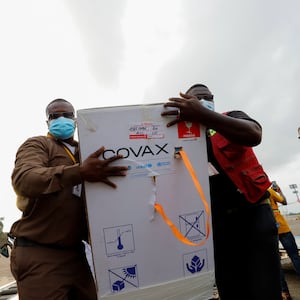Canada has confirmed its first two cases of the super-mutated Omicron variant that is now popping up in countries all over the globe—prompting Israel, Japan, and Morocco to close their borders.
The two patients had recently returned to Canada from Nigeria, according to a statement from Ontario’s Chief Medical Officer of Health.
The news came hours after Dutch officials revealed that 13 of the 61 people who tested positive for COVID-19 on two flights from South Africa to the Netherlands were infected with the new variant.
Each passenger had to either have a vaccine certificate or a negative COVID-19 test before boarding the KLM flights, meaning either the vaccines didn’t stop infection, the tests didn’t pick up the virus, or the virus wasn’t detectable at the time the tests were performed.
The growing number of positive tests will only add to the worldwide jitters over Omicron—which has prompted a slew of countries to ban certain flights, upset the stock market, and sent scientists rushing to discover everything they can about the new strain.
Nearly every country in Europe now has at least one suspected case with many confirming infections linked to travel to Africa. Denmark, Germany, Austria, Italy, Belgium and the Czech Republic have confirmed cases; several other countries have identified suspected cases. Australia also confirmed two cases of the new variant on Sunday in travelers who had arrived from Africa. In Italy, a vaccinated man who flew from Mozambique to Milan tested positive at the airport on arrival, but his case was not confirmed as Omicron until he traveled south to his home near Naples. Health authorities are now scrambling to do contact tracing to determine whom he or his family might have been in contact with.

The discovery of the Omicron variant has sparked travel restrictions.
Hollie Adams/Hollie Adams/GettyAustralia has also confirmed its first cases of the variant. The U.K., no longer part of the European Union, has at least two confirmed cases, and will now require everyone to quarantine for at least two days and take a PCR test upon arrival into the country. The U.S. has not yet confirmed a case but Dr. Anthony Fauci said it’s only a matter of time, as officials banned flights from eight countries. Israel, which has just one confirmed case, took the extreme step of blocking all foreigners from entering the country for at least two weeks.
“It’s a temporary and necessary step,” Prime Minister Naftali Bennett said.
The world should have been ready for Omicron. For months, health experts have warned that global vaccination is the only way out of the pandemic, yet just 7 percent of the African continent has received even a first dose of any vaccine. When India was the epicenter of the pandemic due to a delayed vaccine rollout—which propagated the Delta variant among the unvaccinated—everyone said Africa would be next. And it was.
Michael Head, a senior research fellow in global health at the University of Southampton, told CNN that variants like Delta and now Omicron are a “natural consequence of being too slow to vaccinate the world.” He said, “We still have large unvaccinated populations, like we have across sub-Saharan Africa, and these are susceptible to big outbreaks.”
The global approach has been to just close off southern Africa despite the fact that the South African health authority has said at least so far the Omicron cases don’t seem to be any more severe than other variants. The president of Malawi said Sunday that closing off much of Africa for being transparent about contagion is nothing more than “Afrophobia.” Writing on his Facebook Page, he said the travel bans were uncalled for. “Covid measures must be based on science, not Afrophobia.”
Researchers know that Omicron differs from previous strains of COVID in that it has more than 30 mutations to its spike protein—which is what allows it to bind to host cells. That raises the question of whether it is more transmissible; some experts fear the answer is yes, because the emergence of Omicron coincides with a sudden surge in new cases in South Africa.
Another big question is how easily Omicron can subvert the vaccine and whether it can cause severe illness or death in the vaccinated. David Hui, a pandemic adviser in Hong Kong, said it was found in two people who had been vaccinated with the Pfizer shot, but their symptoms were very mild.
On Face the Nation on Sunday, Dr. Scott Gottlieb was hopeful that current vaccines could still be effective against the new variant, especially with booster shots. He said that the vaccine makers “have a pretty good degree of confidence that a boosted vaccine—three full doses of vaccine—is going to be fairly protective against this new variant.”
Gottlieb added that it was “almost a certainty” that Omicron is already circulating in the U.S. but said the travel ban on South Africa was too onerous. “We’re punishing South Africa for doing the right thing and telling other nations ... we’re giving them a real disincentive to [share data] because if they turn over new variants, this is what’s going to happen to them.”







